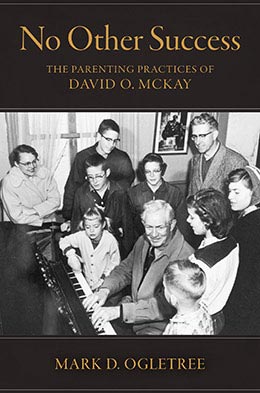Epilogue
Mark D. Ogletree, “Epilogue,” in No Other Success: The Parenting Practices of David O. McKay, ed. Douglas D. Alder (Provo, UT: Religious Studies Center; Salt Lake City: Deseret Book, 2017), 113-115.
President David O. McKay was not a perfect father or husband; however, he was driven by the desire to be a disciple of Jesus Christ. He taught that “members of the Church are under obligation to make the sinless son of man their ideal. He is the one perfect being who ever walked the earth; the sublimest example of nobility; godlike in nature, perfect in his love; our Redeemer; our Savior; the immaculate Son of our Eternal Father; the Light, the Life, the Way.”[1] It was President McKay’s mission to become as much like our Savior, Jesus Christ, as he possibly could. He sought to develop the Christlike attributes of patience, mercy, kindness, and charity. Above anyone else, members of his family were the beneficiaries of his quest toward a Christlike life.
Besides striving to live as the Savior, President McKay also found ways to connect himself to his children. He lived in an era where men were just beginning to take a more active role in parenting and discipline. Arguably, he was busier than most of his contemporaries, yet he found ways to be involved with his children in every aspect of their lives—from sports, to music, to academics, to spirituality. Because of his positive relationship with his children, they accepted his beliefs and ideals, and they desired to be with him as often as they could—even if that meant spending a day laboring on their farm or traveling abroad with him on Church assignments. Speaking of his parents, Lawrence explained, “We learned to love them because they first dearly loved each other and us.”[2]
Furthermore, President McKay never wanted his children to feel obligated to “live right” or “be good” because of the high position he held in the Church. Instead, he seemed to desire more than anything else that his children would do the right things for the right reasons. He wanted them to do good because that is how disciples of Jesus Christ should behave. He taught his children, as well as the membership of the Church, that “the highest of all ideals are the teachings and particularly the life of Jesus of Nazareth, and that man is most truly great who is most Christlike. What you sincerely in your heart think of Christ will determine what you are, will largely determine what your acts will be.”[3] President McKay pointed his children toward the Savior by what he taught and certainly by how he lived.
President David O. McKay made his family his highest priority. Even though he was pulled in many directions by his employment, church service, civic duties, and even farm responsibilities, he made sure that his family came first. Contemporary fathers should be able to relate to President McKay in terms of his busy schedule and his efforts to balance work, family, and Church responsibilities. President McKay identified what was most important in his life, and then he acted accordingly. His teachings about the family were not mere rhetoric or lip service. He truly lived as he taught. In a general conference, he declared:
One of our most precious possessions is our families. The domestic relations precede, and, in our present existence, are worth more than all other social ties. They give the first throb to the heart and unseal the deep fountains of its love. Home is the chief school of human virtues. Its responsibilities, joys, sorrows, smiles, tears, hopes, and solicitudes form the chief interests of human life. . . .
When one puts business or pleasure above his home, he that moment starts on the downgrade to soul-weakness. When the club becomes more attractive to any man than his home, it is time for him to confess in bitter shame that he has failed to measure up to the supreme opportunity of his life and flunked in the final test of true manhood. . . . The poorest shack in which love prevails over a united family is of greater value to God and future humanity than any other riches. In such a home God can work miracles and will work miracles.[4]
President McKay’s beliefs and perceptions about parenthood are timeless. His example and teachings can benefit all families and fathers today. The challenges that David O. McKay faced as a father years ago are not very different than the struggles that accompany contemporary fatherhood. Modern fathers should look to President David O. McKay as a role model of successful fatherhood and follow his example of how to navigate through the difficult, yet joyous times of parenthood.
Notes
[1] David O. McKay, Treasures of Life, ed. Clare Middlemiss (Whitefish, MT: Literary Licensing, 2011), 210.
[2] McKay, My Father, David O. McKay, 99.
[3] David O. McKay, in Conference Report, April 1951, 93.
[4] David O. McKay, in Conference Report, April 1964, 5.
